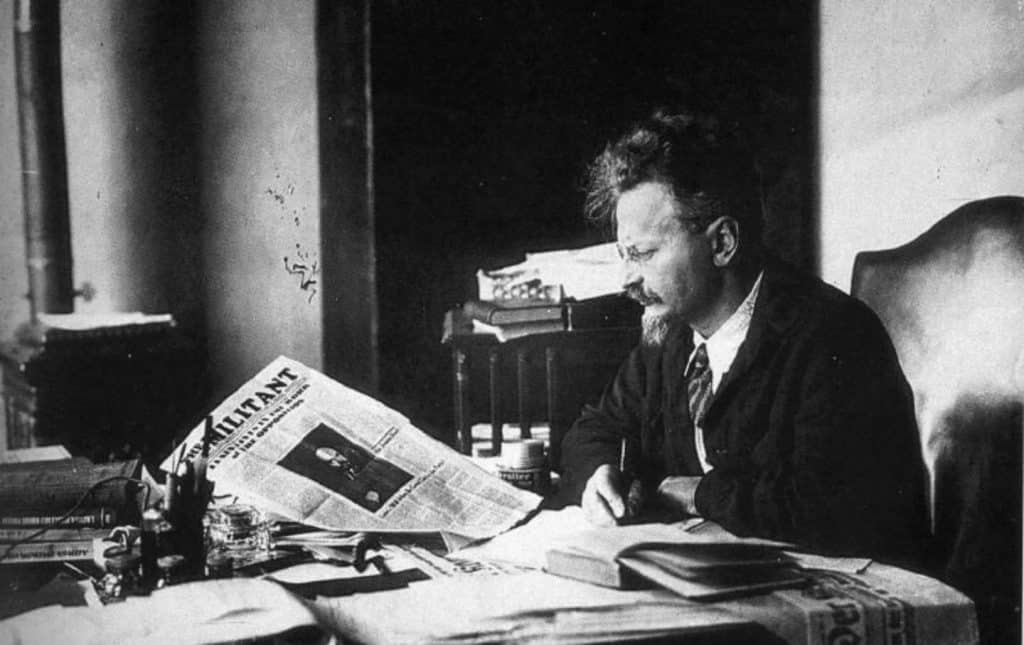Hi comrades. Thank you for inviting me to this event to commemorate the life and ideas of Trotsky. My name is Maryam Alaniz, I’m a worker and student living in New York City and a militant with Left Voice which is part of the La Izquierda Diario network.
I wanted to talk a little bit about the relevance of Trotsky’s ideas considering the emergence of recent political phenomena in the US, including a the shift to the left at the level of consciousness among of a new generation of youth and workers, the emergence of processes of class struggle like the BLM movement and unionization struggles in important multinational companies like Amazon, as well as the interventions of the socialist left in general and Left Voice in particular, which like MTS has the task of building a revolutionary organization in the midst of these important phenomena.
To start, I think it’s important to situate why this phenomena is emerging, and I wanted to do so using my own experience as a young worker. I’m part of a generation that has been shaped by the several deep intersecting crises of capitalism from economic crises to environmental crises to health crises and everything in between. As many of you know, the 2008 crisis was particularly formative for my generation both structurally and politically. The Occupy Wall Street movement was the first movement I participated in and after politically supporting Obama’s promises of “hope” and “change,” we literally saw overnight the true face of Democrats like Obama after the Wall Street bailouts and disgusting drone strikes in the Middle East. Through experiences like these, youth like myself turned to Sanders, as we were looking for a response to our issues like student debt and our anxieties about the future. While Sanders’ anti-capitalist rhetoric and criticism of the Democrats and their neoliberal policies appealed to us, we slowly began to see the limits of Sanders’ strategy and the strategy of other reformists in organizations like DSA (Democratic Socialists of America), which is the largest socialist organization in the United States.
Knowing that this exploitative and oppressive system is at the root of our problems, we saw how this sector of the left politically subordinated itself to the capitalist and imperialism Democratic Party, without a strategic perspective beyond winning moderate reforms and convincing us that us, the working class, who in reality has the power to shut down production, doesn’t have much more power than voting for Democrats, the people who want to do everything possible to keep the system in place.
For me, as the daughter of immigrants from Iran, it was a particularly hard pill to swallow, the idea that our path to getting what we want meant continued loyalty to the party of imperialist capital,the idea that my rights are worth more than the rights of workers in Iran or Mexico because I know my comrades in Mexico understand intimately what imperialist oppression is and the violence it brings.
For other youth and workers, the process of politicization was accelerated by the experience of the pandemic which taught us how the working class is essential, the BLM movement which showed us the role of the police under capitalism, and the current attacks on democratic rights, including the right to an abortion, which are highlighting the undemocratic nature of bourgeois democracy. As the contradictions of capitalism become clearer and clearer for people like myself, and with another deep economic crisis on the horizon, it’s clear that we are living through historic times. In the Trotskyist Fraction, -our international organization- , we refer to the current period as a revived era of crises, wars and revolutions and it is easy to see why.
More and more of us are realizing that we don’t owe anything to a system that produces reactionary wars like the war in Ukraine or the wars I grew up with in the Middle East, horrifying the world once again and illuminated the atrocities of capitalism in the imperialist epoch, where US imperialism spends trillions on military funding and weapons while workers faces hunger and misery around the world.
In some ways, this current moment harkens back to the 30s, another period that was shaped profoundly by crises, wars, and revolutions that had awakened a new generation to political life and was marked by important experiences in class struggle, including here in the U.S. It’s during that period that Trotsky, writing in exile due to political repression, gave fundamental importance and creative thinking to the question of how to build a revolutionary organization in the U.S., the heart of imperialism.
Using Trotsky’s method, the American Trotskyists were able to play a key political role during historic struggles like the Minneapolis and Toledo strikes and the massive anti-Nazi counterprotest in New York City. Through emphasizing political struggle against reformist tendencies in the workers movement and putting forward a revolutionary program, with the aim of organizing the most revolutionary elements of the working class struggles, the Trotskyists from my tradition here in the U.S. were able to build a revolutionary tendency with a perspective toward international revolutionary struggle in the midst of a very convulsive period.
Take for example the experience of the Minneapolis strike, which Trotskyist leader, James P. Cannon described as a fusion between “the native militancy of the workers” and a “politically conscious leadership,” a combination that he later described as having the power to “conquer the whole world.”
From the experience of the Minneapolis and Toledo strikes and at Trotsky’s urging, the American Workers Party emerged in 1934 as a result of a fusion between the Communist League of America and the Workers Party of America. A year later, in 1935, Trotsky helped lead a political struggle within the American Workers Party to have a special tactic toward the new workers and youth of the American Socialist Party, who had been radicalized by international events such as the rise of fascism. The Socialist Workers Party emerged from this experience in 1936.
Me and my comrades in Left Voice hope to place ourselves within this tradition of struggle in the Trotskyist movement and aim to play a role in engaging and fusing with the most revolutionary elements of the most dynamic phenomena today, making common experiences in class struggle and leading political struggles, using our website as a tool to do so, to reach the sectors we are in dialogue with – left youth, workers, and the oppressed – beyond our forces alone.
Without a doubt, the development of class struggle here in the U.S. and around the world in the context of this heightened political period is creating new possibilities for the convergence of revolutionary Marxism and workers’ movements.
Going back to the example, of the phenomena of incipient grassroots unionism here in the U.S., we are seeing Generation U as they are called, see unions as fighting tools to organize against the exploitation and oppression we face under capitalism and as spaces that can that can throw off the yoke of traditional union bureaucracies. Concretely, more and more workers are see the importance of fighting in your workplaces against things like racism, xenophobia, sexism, and homphobia. We are part of a generation that mobilized against racism and inequality, so for many of us, especially those oppressed minorities that are part of the most exploited sectors of the working class, there is no dividing line between the fight against discrimination and the fight for unions.
Using the revolutionary principles of Trotskyism as our compass, we can push these experiences further toward promoting self-organization against the labor movement and social movement bureaucracies, toward the perspective that we need to unify our struggles across workplaces, and movements like the fight for abortion rights with a perspective of workers hegemony. We can point out the importance of class independence and the need for a revolutionary organization to coordinate our struggles. We need to put forward these perspectives while challenging the prevailing perspective on the left, the idea that we need to subordinate ourselves to any bureaucracy, even a more progressive one, the idea that we can continue to rely on the Democratic Party, the idea that we should emphasize class-wide demands and subordinate the fight against oppression, or even the idea that we shouldn’t challenge the chauvinistic tendencies of the US labor movement.
Clearly, the tradition we inherit from Trotskyism demands our engagement with key political questions. For a long time being a Trotskyist meant swimming vigorously against the current, but now as the capitalist crisis deepens, the weaknesses of reformist and bureaucratic leaderships can become an advantage to us and the door is open for us to play decisive roles in class struggle like the Minneapolis and Toledo strikes.
We can do so by relying on the ideas and principles we’ve inherited due to decades of experiences in class struggle, as well as the programmatic clarity offered by the Marxist method, which Trotsky applied creatively and dialectically. It’s no wonder people like myself have found relevance and resonance in Trotsky’s ideas many decades after his death.
But that is not enough if we want to overthrow this system and start the process of building a new one, we need to advance in the construction of a revolutionary party to build a real force that is capable of withstanding all the political tests and challenges that stand in our way. After joining the Bolshevik Party, Trotsky supported the building of revolutionary parties for the rest of his life from the formation of the SWP to the fourth international, up until the day he was assassinated because as he said himself: “The revolutionary Party unites within itself the flower of the progressive [working] class. Without a Party which is able to orientate itself in its environment, appreciate the progress and rhythm of events and early win the confidence of the masses, the victory of the proletarian revolution is impossible. These are the reciprocal relations between the objective and the subjective factors of insurrection and revolution.”
Therefore, we need a revolutionary party of Generation U, of those who were on the streets during Black Lives Matter, those who risked their lives during the pandemic, those who are mobilizing against the attacks on democratic rights across the country. And we also need to organize ourselves internationally. Trotsky knew that internationalism had to be more than a sentiment. It was a call to action. That meant building an international party, not just a national one, anchored staunchly in anti-imperialism. That’s why I’m proud to be struggling for an international organization with my comrades from the MTS and around the world, bringing together youth like myself across borders to recover a revolutionary internationalist perspective. Against the theoretical, strategic, and programmatic betrayals of Stalinism.
On this day, where we are commemorating Trotsky’s assasination, let’s hope that as more and more workers and youth around the world turn to socialist ideas in the midst of this historic crisis of capitalism that we can also bring these members of our class closer to the Trotskyist perspective. Fusing the generations who have been waging this battle for decades, with my generation, and the future generations who also know capitalism has nothing to offer them.











